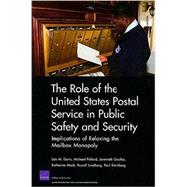
| Preface | p. iii |
| Figures | p. ix |
| Tables | p. xi |
| Summary | p. xiii |
| Acknowledgments | p. xxiii |
| Abbreviations | p. xxv |
| Introduction | p. 1 |
| Background | p. 1 |
| Study Approach | p. 2 |
| Study Limitations | p. 3 |
| Organization of This Monograph | p. 5 |
| The USP's Monopolies and Its Role in Public Safety | p. 7 |
| Introduction to the USPS Monopolies | p. 7 |
| The Mailbox Rule | p. 8 |
| The Postal Monopoly | p. 9 |
| What Happens If the Mailbox Rule Is Relaxed? | p. 11 |
| The Public Safety and Security Roles of the USPS and Private Couriers | p. 14 |
| National Response Framework and Cities Readiness Initiative | p. 14 |
| National Infrastructure Protection Plan | p. 15 |
| Customs-Trade Partnership Against Terrorism | p. 15 |
| Carrier Alert | p. 16 |
| Public Safety Education and Awareness | p. 16 |
| The Role of the IS in Public Safety and Security | p. 20 |
| Relaxing the Mailbox Rule: Effect on Public Safety and Security Incidents | p. 23 |
| Types of Security Incidents and Trends | p. 24 |
| Volume Attacks | p. 26 |
| Fraud | p. 29 |
| Financial Crime | p. 32 |
| Suspicious Incidents | p. 36 |
| Improvised Explosive Devices (Bombs) | p. 40 |
| Differences Between the USPS and Private Courier Companies in Training, Public Accountability, and Oversight | p. 41 |
| Federal Regulations That Apply to Both the USPS and Private Couriers | p. 42 |
| Differences in Training | p. 43 |
| Differences in Oversight and Accountability Mechanisms | p. 57 |
| Security Implications of Relaxing the Mailbox Rule | p. 59 |
| General Implications of Relaxing the Mailbox Rule | p. 59 |
| Relaxing the Mailbox Rule: Implications for Security Incidents | p. 61 |
| Summary | p. 65 |
| Relaxing the Mailbox Rule: Effect on the IS's Ability to Detect, Deter, and Investigate Crime | p. 67 |
| Relaxing the Mailbox Rule: Effect on Federal Jurisdiction over Mail | p. 68 |
| "Mail" and the Mailbox | p. 68 |
| Diversion of Mail to Private Couriers | p. 72 |
| Relaxing the Mailbox Rule: Effect on Investigation Costs | p. 75 |
| Relaxing the Mailbox Rule: Effect on Tracking Trends in Mail Crime | p. 76 |
| Relaxing the Mailbox Rule: Effect on the Ability to Deter Crime | p. 78 |
| Does Enforcement of the Mailbox Rule Deter the Acts It Proscribes? | p. 78 |
| Does Enforcement Deter Crimes at the Mailbox? | p. 80 |
| Do the USPS and IS Deter Crimes That Might Be Diverted to Private Couriers? | p. 81 |
| Summary | p. 83 |
| Public Perceptions About Relaxing the Mailbox Rule | p. 85 |
| Methods | p. 86 |
| Key Survey Findings | p. 88 |
| Most Respondents Have a Positive Perception of the USPS | p. 88 |
| Most Respondents Oppose Removing the Mailbox Rule | p. 90 |
| Security Is One Concern Among Many | p. 95 |
| Households More Likely to Be Affected Are Less Opposed | p. 102 |
| Summary | p. 106 |
| Conclusions and Issues for Further Consideration | p. 109 |
| Conclusions | p. 109 |
| Issues to Be Considered If the Mailbox Rule Were Relaxed | p. 112 |
| p. 115 | |
| Methods | p. 115 |
| Detailed Tables of Incidents | p. 127 |
| Guidelines and Training | p. 145 |
| Differences Between FTC and IS Fraud Data | p. 177 |
| References | p. 181 |
| Table of Contents provided by Ingram. All Rights Reserved. |
The New copy of this book will include any supplemental materials advertised. Please check the title of the book to determine if it should include any access cards, study guides, lab manuals, CDs, etc.
The Used, Rental and eBook copies of this book are not guaranteed to include any supplemental materials. Typically, only the book itself is included. This is true even if the title states it includes any access cards, study guides, lab manuals, CDs, etc.